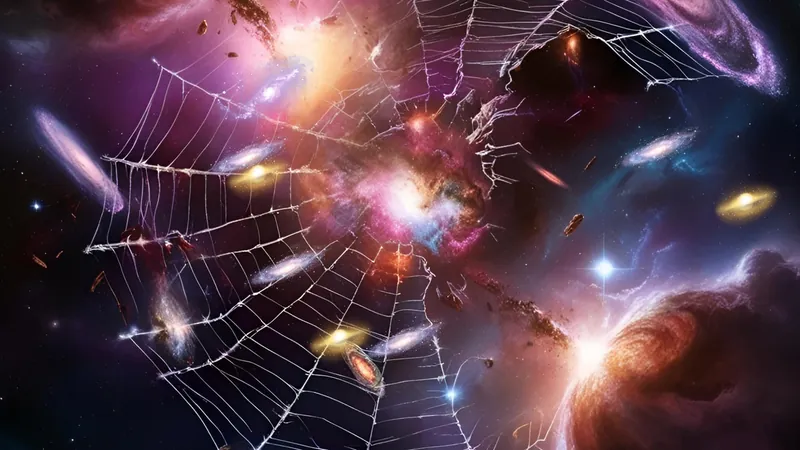
Unraveling the Mystery of Dark Energy: Could Unknown Physics Be Creating 'Antigravity' Effects in the Universe?
2025-03-27
Author: Mei
Introduction
Dark energy, the enigmatic force propelling the universe's expansion, might have an unexpected ally that helps it counteract gravity's clumping effects, potentially resulting in an 'antigravity' phenomenon. Recent analysis of astronomical data suggests that unknown physics could be at play, contributing to the slower formation of grand cosmic structures like superclusters, which are massive assemblies of galaxies.
The Role of Gravity in the Cosmic Web
The universe's large-scale structure comprises intricate networks of galaxies and clusters arranged in a cosmic web. Over billions of years, gravity has primarily influenced this structure's development, but current findings indicate that the pace of these formations is significantly less today than in the universe's early 13.8 billion-year history.
Insights from BOSS
Using insights derived from the Baryon Oscillation Spectroscopic Survey (BOSS), researchers have shed light on this intriguing phenomenon. BOSS provides a detailed map of luminous red galaxies and quasars, helping astronomers observe variations in matter from the universe's youthful stages reflected in the Cosmic Microwave Background (CMB), a fossil radiation from shortly after the Big Bang.
Dark Energy's Changing Role
Discovered in 1998, dark energy is currently believed to constitute about 70% of the universe's total energy-matter budget. The conventional explanation is framed by the cosmological constant, symbolized by the Greek letter lambda (Λ), which is thought to signify the energy present in empty space—an idea that may sound bizarre, yet is rooted in quantum mechanics.
However, emerging data from the Dark Energy Spectroscopic Instrument (DESI) have added an extra layer of complexity to the dark energy narrative—suggesting that it may not be a fixed constant but could change over time. This evolving nature contradicts the standard ΛCDM model, which hypothesizes a stable cosmological constant.
Chen elaborated, "Recent DESI results indicate a potential variability in dark energy, prompting us to explore whether this could relate to our observations of structure suppression." Unfortunately, data comparisons have only deepened the mystery instead of providing clear answers.
Why Are Cosmic Structures Slower to Form?
Despite dark energy's dominance today, this was not always the case. Initially, the universe was driven by radiation following the Big Bang, which led to a rapid expansion. Eventually, gravity reigned in the expansion, allowing the first stars and galaxies to form.
Approximately 4 to 5 billion years ago, something peculiar occurred—the universe began to accelerate in its expansion, marking the onset of the dark energy-dominated era. Yet, the mechanism responsible for this transition from a matter-dominated universe to one governed by dark energy remains elusive.
The results from Chen's team suggest that while dark energy might be related to the suppression of large cosmic structures, it alone cannot account for the slower formation rates observed today. Furthermore, when the researchers applied their findings against the backdrop of galaxy clustering, they uncovered a minuscule probability—just 1 in 300,000—that random chance could explain their data.
The team is poised to re-evaluate their conclusions using enhanced datasets, including new insights from DESI that were recently made public. Chen anticipates that "the more we explore, the more questions will arise."
Conclusion: The Quest for Cosmic Understanding
The ongoing investigation into dark energy and its interactions highlights an exciting frontier in cosmology, where unresolved questions abound regarding the universe's evolution and the fundamental forces at play. As scientists delve deeper into cosmic mysteries, the possibility that unknown physics could redefine our understanding of gravity, dark energy, and the very fabric of space offers tantalizing implications for the future of astrophysics.
Whether this leads to revelations about our universe or further puzzles, one thing is certain: the quest for knowledge in the cosmos is just beginning. Stay tuned, as scientists continue to unlock the secrets held within the dark energy and beyond!


 Brasil (PT)
Brasil (PT)
 Canada (EN)
Canada (EN)
 Chile (ES)
Chile (ES)
 Česko (CS)
Česko (CS)
 대한민국 (KO)
대한민국 (KO)
 España (ES)
España (ES)
 France (FR)
France (FR)
 Hong Kong (EN)
Hong Kong (EN)
 Italia (IT)
Italia (IT)
 日本 (JA)
日本 (JA)
 Magyarország (HU)
Magyarország (HU)
 Norge (NO)
Norge (NO)
 Polska (PL)
Polska (PL)
 Schweiz (DE)
Schweiz (DE)
 Singapore (EN)
Singapore (EN)
 Sverige (SV)
Sverige (SV)
 Suomi (FI)
Suomi (FI)
 Türkiye (TR)
Türkiye (TR)
 الإمارات العربية المتحدة (AR)
الإمارات العربية المتحدة (AR)